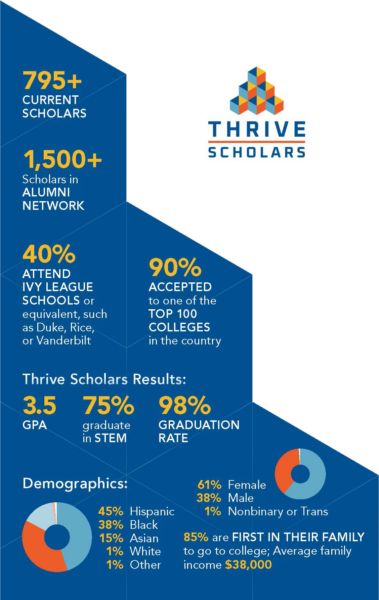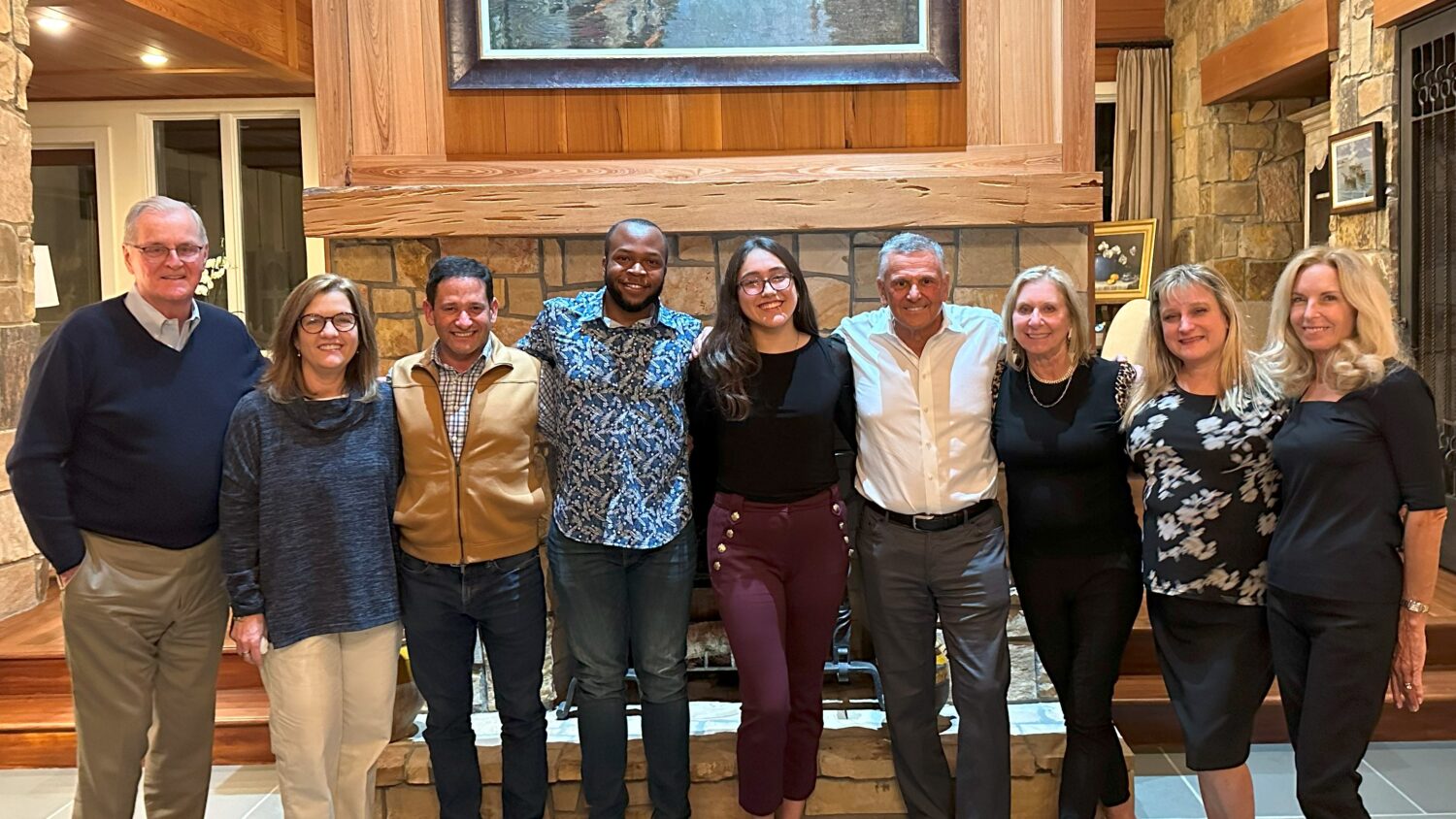How a National Best Practice Program Came to Northeast Florida
In early 2020, Jim and Trisha London were thinking about retiring from Los Angeles.
For 50 years, the Londons had run a successful orthopedic surgery practice in LA. They were also philanthropists, the founders of a nationally renowned organization called Thrive Scholars, which helps high-achieving, low-income students succeed in top-tier colleges.
The Londons visited Ponte Vedra on a whim during a trip to Miami. Charmed by the proximity to Mayo Clinic and the easier way of life, they bought a house in Marsh Landing four days later.
One day, they took a tour of the Ponte Vedra Inn and Country Club and met Herb Peyton, the club owner and Chairman of Gate Petroleum. They told Mr. Peyton about Thrive Scholars, hoping to connect with leaders in the community who could help it expand to Northeast Florida.
Mr. Peyton suggested they reach out to his son, John, the former Jacksonville mayor and alumnus of the Weaver Philanthropic Initiative.
The next call was to Nina Waters at The Community Foundation.
—
Nina Waters, President of The Community Foundation, had long worked to support students who were falling behind in public schools. Through a series of conversations with the Londons, she realized that Thrive Scholars was tackling education equity from a different angle.
“My career has focused on the students who are struggling the most, in prior roles and through the Quality Education For All Initiative and Fund,” Waters said. “Thrive Scholars works with the students who often don’t get support or guidance, because they’re doing well academically. But they need and deserve support, too.”
The Thrive Scholars model is designed around a special but little-known opportunity for low-income students to attend the country’s most elite colleges and universities for free or significantly reduced tuition. Many prestigious schools have created generous scholarship packages that cover tuition and expenses for students from low-income families. But significant barriers still limit participation – including that many students have never even heard of this opportunity.
Thrive Scholars supports students for six years, from junior year of high school all the way to their first job, and it uniquely addresses barriers to success for students of color and from low-income families. The goal is to develop a pipeline of talented, diverse leaders who can excel at the top of their professions, addressing a severe shortage of diversity at the nation’s top companies and professions, and create intergenerational wealth within communities of color.
The program recruits scholars in their junior year of high school, offering a Summer Academy that offers 350 hours of college-level instruction in math, writing, and critical thinking, taught by college professors at Amherst and the University of Chicago. It also helps them think through their college and career goals and understand the college application process. Early guidance is key for steering students toward the most elite colleges, which may cost much less than community colleges and public universities that are closer to home – a surprising calculation for many students. As a result, 90 percent of Thrive Scholars go to the top 100 colleges in the country – about 40 percent attend the Ivy League schools or similarly prestigious schools.
Then, during college, Thrive Scholars provides students a $1,500 stipend to cover out-of-pocket costs allow them to experience the same college experience as students from wealthier backgrounds. Students are paired with mentors, and attend a career program that helps them learn the soft skills they need to succeed in a collaborative modern workplace. The academic support has helped ensure that students don’t wind up dropping out of challenging majors because they need to keep up their grades.
“Our students know there are good jobs in STEM. They know the discoveries that are taking place from medicine to Mars, and it excites them to be part of that,” Jim London said. “They are already interested in STEM – what they need is the math skills.”
The results of the model are impressive: On average, fewer than 20 percent of students of color and 50 percent of white students who enter a STEM major will finish five years later. But for Thrive Scholars, that figure is 75 percent.
The return on investment is outstanding, because Thrive Scholars invests about $50,000 per student, and leverages a $325,000 per-student scholarship package from the most prestigious schools.
The students’ stories are even more astounding. The Londons have supported a student who bounced from group home to group home as a child, who went on to graduate from Yale Law School, as well as a student who was homeless, who graduated from Harvard College. Many students worked jobs in high school to help support their families. As alumni, they have gone on to six-figure starting salaries, reaching back to help their parents, and having the means to invest in their own children’s education, building intergenerational wealth.
“College is great, but our ultimate goal is the high-level job,” said Jim London. “One of our north stars is economic mobility for these students.”
After a series of conversations in Ponte Vedra, it became clear to Waters that Thrive Scholars was aligned with The Community Foundation’s strategic goal to advance equity and address structural racism in Northeast Florida. She began to plan a meeting with local business leaders and philanthropists.
—
One of those leaders was Dave Sweeney, CEO of RS&H, one of the nation’s leading architecture, engineering and consulting firms. In 2017, RS&H leaders worked with The Community Foundation to create a corporate giving strategy, initially focused on providing grants to non-profits where RS&H employees were already actively donating their personal time and energy. This initial focus expanded, in subsequent years, to include helping under-represented students succeed in STEM careers through the financial support of successful, existing scholarship programs active in their industry. Ultimately, with the guidance and support of The Community Foundation, RS&H continues to implement a strategy that succeeds in magnifying the positive impact of both their employees and existing non-profits.
As the Londons presented the Thrive Scholars program, the challenges facing these students sounded familiar to him.
Sweeney grew up in a rural community in upstate New York. His high school academic performance was just enough to gain him entry to a good engineering university.
“When I left home to attend college, I thought I was well equipped,” Sweeney said. “What I quickly learned was that I was not as prepared as I thought.”
While his parents had limited college experiences, they nevertheless encouraged him to stick with engineering, even though his grades were suffering and he was often discouraged and felt less prepared than his college contemporaries. That parental support, in Sweeney’s view, was essential to weathering the challenges he faced in those early years away from home and as he began to build his professional career.
Other leaders in the room felt similarly moved by the opportunity. One donor spoke about how he had tried to send bright students to college on scholarships, only to see them drop out or fail.
“No one had had someone go to college and graduate, and everyone had tried really hard,” Trisha London said. “After they heard Jim talk, they realized it’s more complicated than just getting into college.”
The alignment was no accident.
“The power of The Community Foundation, I found, was the ability to convene people,” Sweeney said. “They know what people are doing in the community, what their interests are, and where their philanthropic hearts lie.”
Within four weeks, Thrive Scholars had raised $1.8 million, with contributions from The Community Fund and the donors at the meeting, to fully fund the program for three years in Putnam and Duval counties, targeting a rural and urban setting. It defied the Londons’ expectations about their first site in the South.
 “As a compliment to Jacksonville, we’re in Los Angeles, Chicago, New York, and Cleveland, and that was faster than any other city in raising money,” Jim said. “We raised more money in a quicker time than any of those other cities.”
“As a compliment to Jacksonville, we’re in Los Angeles, Chicago, New York, and Cleveland, and that was faster than any other city in raising money,” Jim said. “We raised more money in a quicker time than any of those other cities.”
Sweeney hopes some of the Northeast Florida scholars will return to the area and work at local companies like RS&H, which is deeply invested in diversifying its workforce.
“I think Jacksonville is at an incredible inflection point,” Sweeney said. “Part of the success story will be how we attract and retain that talented workforce of tomorrow. If we can invest in all aspects of our community, inclusive of supporting high-achieving young people, I hope they will look at Jacksonville as a place they want to come back and build their lives.”
